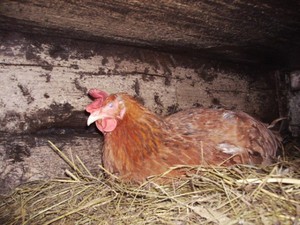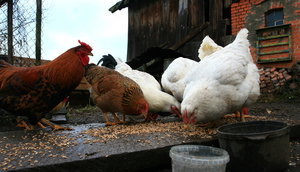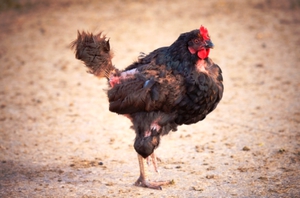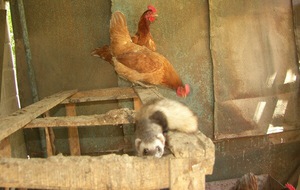In a crisis, the people of Russia begin to think about how to keep afloat his family and about the extra income. Many are owners of villas, town houses or huts in the village.
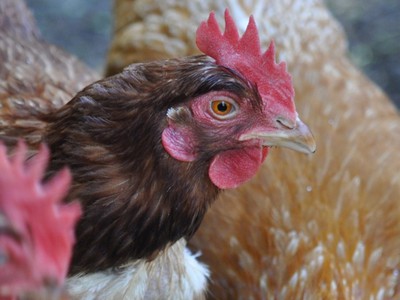
In such conditions it is possible to breed chickens and sell the eggs to friends and neighbors or even in the market, if the volume of the resulting product allow.
If the waiting time of eggs was delayed, and the chickens sort of like not going to create your product, is to find out the reasons of such behavior and try to resolve them quickly.
Why stopped laying hens
When choosing hens in your coop, you can pay attention to the hybrid breed, with high productivity and resistance to stress or to opt for ordinary, less demanding breeds of chickens.
It should be borne in mind that conventional chickens are very lose hybrid individuals, consuming a lot more food later and start laying eggs. They also have a lower level of egg production than hybrid chickens. For example, plain chicken is able to carry from one hundred and fifty to two hundred and thirty eggs per year, while a hybrid breed of Volzhskiy-3, Loman-brown, new Hampshire and the other from three hundred and fifty eggs, and more.

Experts in the poultry industry there are several main reasons that lead to the fact that chickens stop laying:
- Ill-conceived diet. Chickens don’t get the right amount of nutrients required to lay eggs.
- Bad conditions. Violation of the care and maintenance of chickens-hens can lead to unpleasant consequences.
- Disease. After the infection of any disease or appearance in the henhouse infections and viruses, birds lose their ability to rush.
- Molt. During molting hen is vulnerable and not always feels good, that affects egg production.
- Poor lighting in the coop.
- The instinct of hatching. Yes, that’s right. All farmers know that in the period of hatching of eggs of the hen stop laying. If you decide to give the birds the opportunity, while chickens will not appear on fresh eggs can only dream about. Also common chicken, which, even if they have to take the eggs, still can not start to rush, because the bird instincts have already sent it to the hatching, not the bearing.
- The age of the hens. Many experts in the poultry industry, and ordinary farmers say that good eggs the hen lays up to two years, then it would be more rational to put it on the meat. Birds can carry up to four years, but the eggs will already be too small. After four years of life, the chicken to keep the egg production need a very good care – good nutrition, extra vitamin feeding and so on. But again – the quality of the product much worse than that of young laying hens.
- The temperature in the coop is constantly changing. Birds need a favorable atmosphere for them to maintain their ability to rush. If the coop then cold, then too hot this has on birds negative impacts.
- Natural enemies. Very often in the coop begin to drop in predators. For example, foxes hauling chickens or rats stealing eggs. A lot of stress for laying hens, so they can lose their skills egg production.
- Unwillingness to be carried in specially designated places. Meet the chickens who are not satisfied with the “nest” prepared by the owner. It can cause inconvenience or be in the wrong place. There are also reasons known only to chickens, which can make them hide in secluded places to carry eggs.
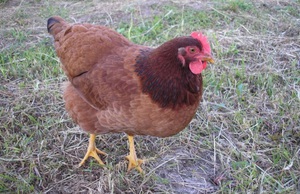
All of these reasons are worth to analyze in detail, and to do, to understand how them fast to eliminate and prevent in the future.
Food
When chickens do not have enough food or it is of poor quality and does not contain all the necessary vitamins and nutrients, it can cause the birds just stop laying.
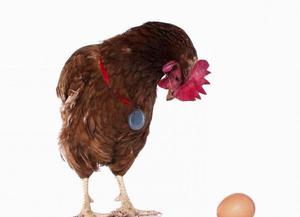
If you carefully read the rules and regulations of feeding laying hens, can be found the following conditions that are required for compliance:
- Each individual should have the required amount of feed to laying hens did not fight and do not compete for food.
- If any chickens hurt others and not give them to eat, you should feed these birds separate from main flock.
- Food should be good quality and fresh. It is unacceptable for feeding laying hens to use the rotten grain and damaged the feed mixture.
- In the diet of hens must contain all essential nutrients and vitamins to the birds were full of energy and was able to give its owner the choicest fresh eggs. In the poop definitely the presence of energetically valuable items, like fats, not less than fifteen per cent protein, carbohydrates. For proper formation of the shell in the body of a chicken should be enough calcium. You should give the feeding that contains this microelement, for example, crushed egg shells.
- First time to feed the chickens should be shortly before turning on the light in the chicken coop. Next feeding is in about ten hours after the first one or six hours before the departure of the birds to sleep.
- In laying hens should always have access to clean drinking water. Lack of fluid severely affects the productivity of birds.
The conditions of detention
In order for hens to be comfortable to be in the coop and nothing to distract them from their eggs, you should create favourable conditions:

- First and foremost, pay attention to the lighting in the coop. Many remember so-called Effect of a budgie? This is when a cage with color bird throws a dark cloth to block light, and the parrot falls asleep, because she thinks it was night. Chickens all the same – in low light they will be a lot of sleep and rest, and inactivity affects egg production. Therefore, make sure that the chicken coop for ten to twelve hours the lights were on – it will be perceived by the hens as day.
- The temperature in the coop should always be above fifteen degrees. At low temperature chicken direct all the energy to maintain heat to keep warm and stop laying, as this power is not enough. Sudden changes in temperature also affect egg production, because hens start to feel sick.
- The ventilation in the coop is necessary to create favorable conditions for laying hens. The ventilation system must be designed so that the coop has always been fresh air, but no drafts.
- Clean the chicken coop the key to successful and continuous egg production. If in a chicken pen will not be garbage and musty odors hens will be better configured for carrying high-quality eggs without unnecessary interruptions.
Disease
Sometimes, newly purchased chicken and chicken proven as a good laying hen ceases to lay eggs. In such cases, the farmers, the question arises “Why it happened and what to do about this problem?”
Chicken susceptible to various diseases. They can catch the virus from the neighbors for the chicken coop or the disease may carry a genetic character. If the time to notice changes in the behavior of birds and to carry out all necessary manipulations for treatment, you will be able to save the reproductive function of laying hens.
Recovered the hen is able to lay eggs, in an amount not to exceed eighty percent of egg production. From this we can conclude that the poultry is more profitable to prevent illness your chicken flock, than to attempt to cure diseased individuals.
Birds at an early age often become victims of infectious bronchitis. It infects the ovaries and oviducts, and then takes a chronic form. This disease causes pathologic changes of reproductive organs, which deprives many of the hens ability to lay eggs.
Some birds suffer from non-communicable diseases, these include:
- Ovarii.
- Peritonitis.
- Salpingitis.
These diseases are inflammatory processes. While not identifying them at early stages of inflammation accumulate in the reproductive organs of laying hens: the oviducts and ovaries. In large industrial farms and factories usually up to fifty percent of individuals suffer from these ailments.
What is characteristic for inflammatory processes, they can then decay, then begin to develop again.
Experts identify several main reasons for the emergence of such diseases:
- Injury.
- Unsanitary conditions in the coop.
- The lack of microelements and as a result, beriberi.
- Moldy poop, eating chicken food.
Is to monitor the health of their wards as such inflammation lead to lower productivity or cessation of egg laying at all.
Other factors
Other reasons leading to the cessation of egg laying or reducing egg production include the failure to comply with the light regime. In their natural environment birds lay eggs to reproduce in the spring or mid-summer.
When the content in captivity, it is worth considering that many breeds of chickens required twelve – sixteen hours of light a day. This should be combined electric lamp and fluorescent light. The lamp should not be too bright, as strong sanctification can cause the layers of stress.
Stress
Stress can bring birds out of the usual rut and lead to cessation of egg-laying. Moving to a different coop the new rooster, attacks by predators – all of these factors are able to cause hens in stress.
When purchasing new chickens, keep in mind that a change of home and owner for them, too, complicated the situation and begin again to rush, they will only six weeks.
You are able to help birds better cope with stress. All you will need is Apple cider vinegar: it acts on feathered Pets as something like a sedative. Add it in the drink every month for one to two weeks twenty milliliters in one liter of water.
Molt
Usually in the fall the chickens there is a period called a molt. It is a natural process, starting approximately from the second year of life birds. Since all the energy of the hens goes into the formation of the new plumage molt can result in a decrease or cessation of egg laying.
It is recommended to add to the diet of chickens peas, cabbage, meat and bone meal, alfalfa and clover. These products contains sulfur, necessary for the laying hens during molting. Specialists in poultry farming is recommended to stop feeding grain in these times.
Molting lasts about six to eight weeks. As soon as the chickens would be a new tail, to start it abundantly feed. This will help the bird recover quicker and it will again start to lay eggs. During this period, the grain should be added sunflower seeds, wheat grains and germinated oats.
Temperature
Too high or too low temperature can cause a decrease or cessation of egg laying. Be careful in winter it does not fall below fifteen degrees Celsius.
Why the hens have stopped laying in the summer? Heat negatively affects the body and health of birds.
In summer, the hens must always be access to fresh and clean water. Control the availability of water in required quantities required. In the open area of the coop should be equipped with seats located in the shade, so the chicken could sit there if he wanted to walk. In especially hot summer days diversify the diet of watermelon, and the henhouse, check the fan.
Predators
If at some point you have ceased to find in the chicken coop eggs, but chicken feel good and a trip to the veterinarian revealed no abnormalities, most likely. your chicken coop is infested pests, namely rats, mice, ferrets or even foxes.
They can simply carry the eggs from the chickens, or frighten them, which prevents them to concentrate on egg-laying.
“Why have chickens stopped laying eggs” and “What to do if the birds do not lay eggs?” – quite often issues not only among novice breeders, but also avid farmers. If you are faced with this problem, our paper is able to explain the major reasons for the lack of egg production.
If you were not able to understand why your chickens do not want to rush and not know what to do, seek help to the veterinarian.
